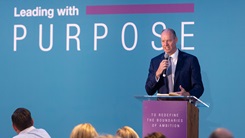Why is ‘certainty’ crucial for public sector development?
These are challenging times for delivering major programmes. We are working in a world of political uncertainty, constrained budgets and ongoing global conflict. These issues impact people, project delivery, supply chains, material prices, and more.
So, what can we do to build confidence and navigate the delivery of globally complex projects and programmes?
It starts with programme directors prioritising certainty. The ability to provide certainty in delivery can alleviate a host of pressures on the progress of major programmes and enables leaders to tackle new challenges quickly and effectively. Of course, we cannot expect unrealistic guarantees, but when we have reasonable degrees of certainty the environment we work in can be more productive and ultimately more enjoyable for all.
But what are the cornerstones of providing certainty as part of project delivery?
Cost certainty
Rising or unexpected costs can put a dampener on any project. Whether due to changes in raw material prices, labour expenses or simply the impact of programme delays, when sponsors are faced with poorer balance sheets this can seriously affect confidence in delivery.
Key to mitigating unexpected costs is building in risk elimination methods into the earliest stages of project programming and then clearly communicating these risks across key stakeholders. This enables team members to anticipate events or risks that could cause cost increases and take early steps to mitigate them. For risks that cannot be easily mitigated, stakeholders will also be empowered to make more informed decisions about project direction, since major costs will be expected rather than a nasty surprise further down the line.
An honest appraisal of where things really are is key to building trust with clients, teams and supply chain partners. When we are all ‘on the same page’, with all parties clearly understanding potential risks, we can work together to mitigate them.
Carbon certainty
Like unexpected cost increases, a higher-than-expected carbon output can knock confidence in a project.
Looking at the UK in particular, the government has committed to hit net zero by 2050, with direct emissions from public sector buildings being reduced by 75% in 2037. Major programmes that fail to live up to these ambitions could face difficult questions from central government, alongside negative public perspectives over how responsibly the project is being managed.
Teams therefore need to take a whole life cycle view on their operations when tackling excess emissions on major programmes. All operations leads need to be held accountable for their carbon outputs and brought into the vision for minimising carbon outputs across all activities. These carbon leads can therefore target innovative delivery to further reduce CO² emissions. Modern Methods of Construction is one such approach, centred around repeatable designs and modules that can be manufactured off-site, leading to more efficient construction and fewer vehicle movements to and from site.
Programme certainty
Major programmes are complex by nature, with a myriad of suppliers, contractors and sub-contractors who need to work together effectively and tackle problems quickly. This simply cannot happen without this integrated plan, alongside a strong delivery partner who can unite different projects to identify opportunities for collaboration.
Essentially, this partner can drive certainty in two ways: improving consistency and delivering a programmatic approach.
No matter how complex, every programme has a series of processes, modules or equipment uses that need to be repeated. Through a focus on continuously improving these repeatable elements, rather than treating them as a series of standalone activities, projects can experience exponential improvements in delivery speed.
Meanwhile, a partner can also drive a programmatic, non-linear approach to programme management. While delays are somewhat inevitable across major programmes, a mature partner will be able to identify opportunities to develop separate workstreams concurrently, enabling progress towards delivery while still offering solutions to unlock delays and blockages. This results in a much more dynamic and flexible approach, able to accommodate and correct issues without sacrificing key milestone dates.
While the course of major projects and programmes doesn’t always run smooth, we can always be prepared for the challenges. If we maintain a programme mindset, continue to optimise repeatable processes and plan our response to the materialisation of key risks, we can deliver more effectively, sustainably and with a far greater sense of certainty.












